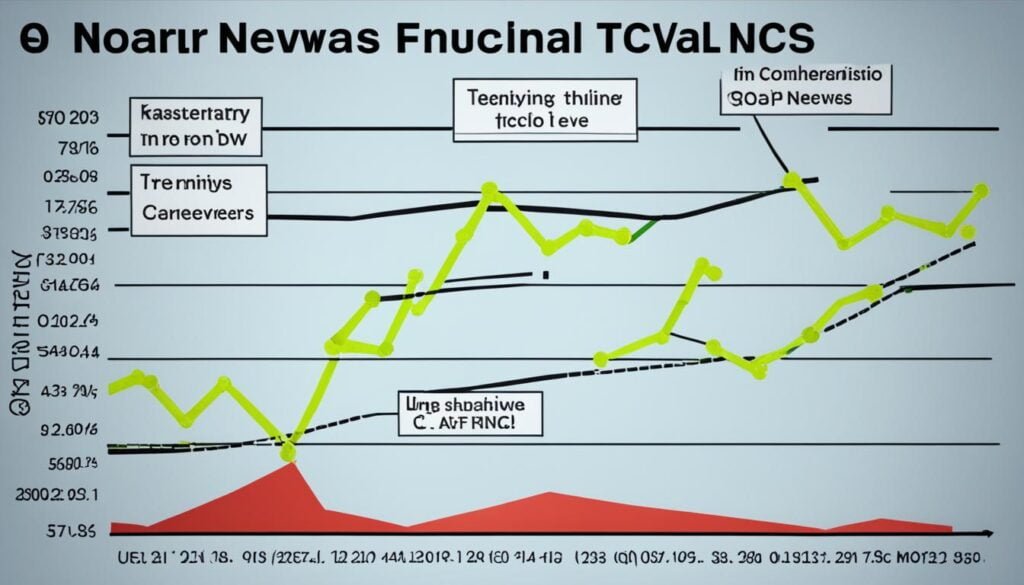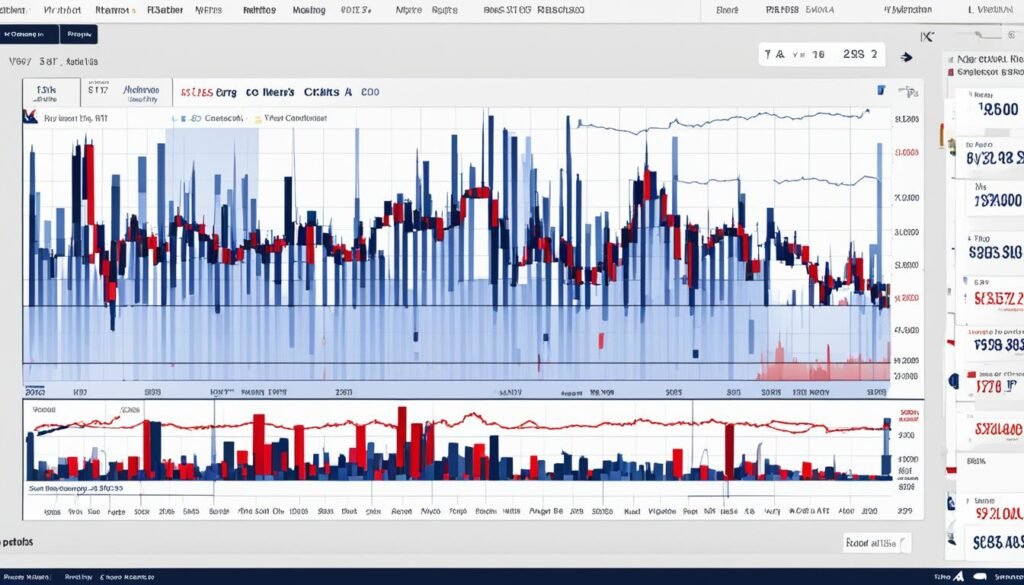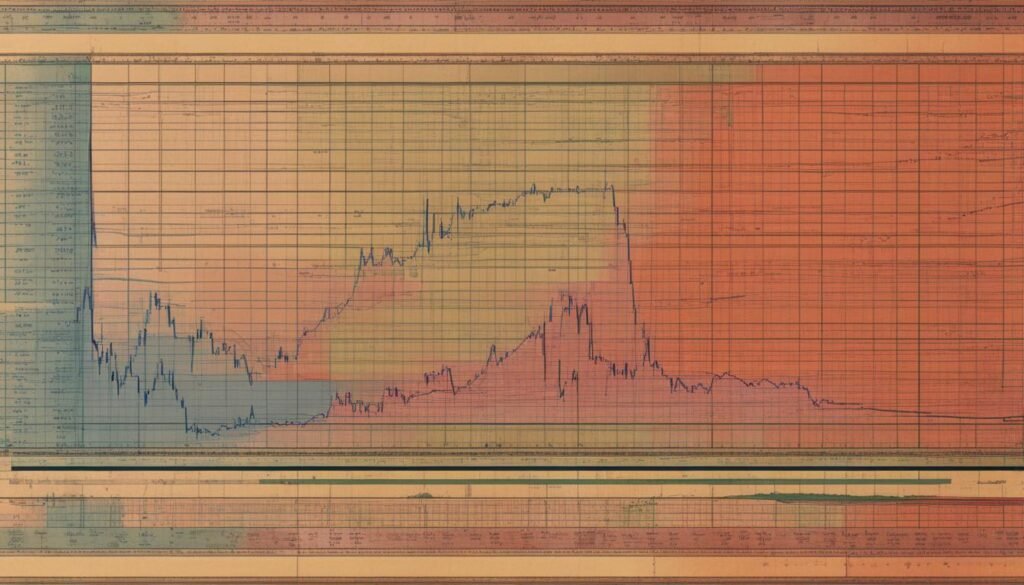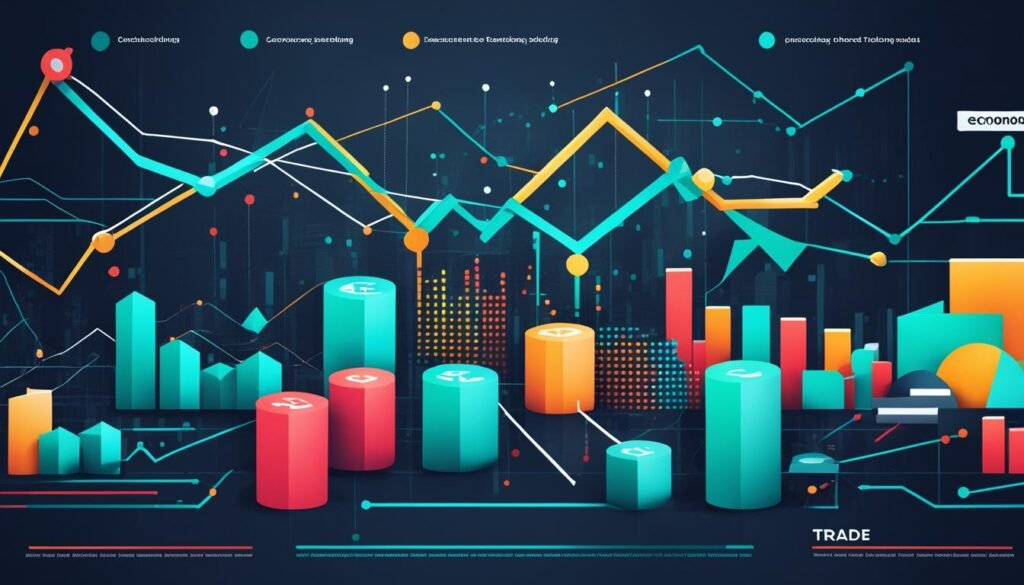Welcome to our article on the importance of news and events in fundamental analysis. Fundamental analysis plays a crucial role in understanding financial markets and making informed investment decisions. By analyzing economic, political, and social events, investors can gain valuable market insights and uncover potential investment opportunities.
In fundamental analysis, news events provide critical information that shapes investment strategies and influences market trends. By staying informed about news events and economic indicators, investors can make well-informed trading decisions and understand the intrinsic value of financial assets.
Unlock the Secret to Forex Success with BOB James’ Top-Performing Signals! Experience the Ease of Proven, MyFXbook-Verified Strategies and Transform Your Trading Journey Today. Don’t Miss Out on Exceptional Performance – Join Now!
News events can have a significant impact on market volatility, creating both risks and opportunities for traders. Understanding the implications of these events is essential for successful fundamental analysis and effective investment strategies.
Throughout this article, we will explore the relationship between fundamental analysis and news events and discuss the importance of key economic indicators and the economic news calendar. We will also delve into trading strategies, risk management, and the limitations of automated trading in the context of news events.
By the end of this article, you will have a comprehensive understanding of how news and events shape fundamental analysis and why they are vital for profitable investment strategies.
Key Takeaways:
- Fundamental analysis is essential for understanding financial markets and making informed investment decisions.
- News events provide critical information and market insights for fundamental analysis.
- Key economic indicators and the economic news calendar are valuable tools for investors practicing fundamental analysis.
- News events can influence market volatility and create trading opportunities.
- Effective risk management is crucial in news trading to protect investments.
Understanding Fundamental Analysis
Fundamental analysis plays a crucial role in the evaluation of financial assets and the identification of market trends. By analyzing economic, political, and social factors, investors can determine the intrinsic value of a financial asset and make informed trading decisions. Fundamental analysis involves the examination of economic indicators that provide insights into the overall health and performance of an economy.
What is Fundamental Analysis?
Fundamental analysis is a method of evaluating the intrinsic value of a financial asset by examining various economic, political, and social factors. It involves analyzing economic indicators, such as GDP growth, interest rates, inflation, and employment data, to understand the overall health of an economy. By understanding the fundamental factors that drive market trends, investors can make informed decisions based on the long-term value of a financial asset.
Key Economic Indicators and Their Importance
Economic indicators are key metrics that provide insights into the performance of an economy. By monitoring indicators such as GDP growth, interest rates, inflation, and employment data, investors can gauge the overall health of an economy and identify market trends. For example, an increase in GDP growth may signal economic expansion and lead to positive market sentiment, while a rise in unemployment rates may indicate economic weakness and result in market volatility. Therefore, understanding and analyzing economic indicators is crucial in fundamental analysis to identify potential trading opportunities.
Economic News Calendar: A Vital Tool for Investors
The economic news calendar is a valuable tool that provides investors with information on upcoming economic and political events. It includes important releases such as interest rate decisions, GDP reports, employment data, and central bank announcements. By staying informed about these news events, investors can anticipate potential market movements and adjust their trading strategies accordingly. The economic news calendar serves as a guide for investors to plan their trading activities and make informed decisions based on expected market volatility.
Understanding fundamental analysis, analyzing economic indicators, and staying updated with the economic news calendar are essential for investors seeking to make informed trading decisions. By combining these strategies, investors can gain insights into market trends, identify trading opportunities, and navigate the complexities of financial markets.
Fundamental Analysis and News Events
In the world of financial markets, the relationship between fundamental analysis and news events is crucial for traders and investors. News events provide the necessary information for fundamental analysis, offering insights into economic, political, and social factors that can impact financial markets. By analyzing these events, traders can gain a deeper understanding of the potential impact on market sentiment and make informed trading decisions.
When it comes to fundamental analysis, news events play a vital role in shaping investment strategies. These events can influence market sentiment, driving market movements and creating trading opportunities. By analyzing news events, traders can assess the potential impact on financial markets and tailor their trading strategies accordingly. This allows them to take advantage of market volatility and make profitable trades.
News events are an integral part of fundamental analysis, as they provide valuable insights into the factors that can shape market trends. By staying informed about upcoming news events, traders can stay ahead of the curve and better understand the potential impact on financial assets. This knowledge allows them to make more informed trading decisions and maximize their chances of success.
It’s important for traders to recognize the significance of news events and their role in shaping trading strategies. By incorporating news events into their fundamental analysis, traders can gain valuable market insights and identify potential trading opportunities. The ability to analyze and interpret news events is a fundamental skill for successful trading in financial markets.
Identifying High-Impact News in Market Movements
Interest Rate Decisions and Forex Markets
Interest rate decisions by central banks play a significant role in forex markets. Central banks utilize interest rate adjustments as a monetary policy tool to regulate their respective economies. These decisions can have a direct impact on market volatility and currency exchange rates. Traders closely monitor interest rate decisions as they can present valuable trading opportunities in the forex market. By keeping a watchful eye on interest rate announcements and understanding their potential implications, traders can position themselves to take advantage of market movements.
Gross Domestic Product (GDP) as a Market Catalyst
Gross Domestic Product (GDP) serves as a crucial market catalyst. GDP measures the economic growth of a country and provides valuable insights into its overall economic health. When GDP releases, such as quarterly GDP reports, become available, they can create market volatility and present trading opportunities. Changes in GDP can significantly impact currency values and stock markets, making GDP releases events that traders closely monitor. By analyzing GDP data and understanding its implications, traders can make informed trading decisions based on anticipated market movements.
In summary, interest rate decisions and Gross Domestic Product (GDP) releases are high-impact news events that can significantly influence market movements. Traders pay close attention to these events as they present unique trading opportunities. By staying informed and analyzing the potential impact of interest rate decisions and GDP releases, traders can adapt their strategies to capitalize on market volatility and make informed trading decisions.
Analyzing the Effects of Political Events on Markets
Political events can have a significant impact on financial markets, creating both opportunities and challenges for traders. In this section, we will explore two specific areas of political influence: trade sanctions and policy decisions, as well as elections and their effects on investor sentiment.
Trade Sanctions and Policy Decisions Impact
Trade sanctions and policy decisions implemented by governments can lead to market volatility and uncertainty. These measures, often aimed at protecting domestic industries or addressing geopolitical issues, can disrupt global trade patterns and create economic shifts. Traders need to closely monitor the implementation and potential consequences of trade sanctions and policy decisions to make informed trading decisions.
For example, when trade sanctions are imposed, certain industries or companies may be directly affected, while others may benefit from reduced competition. By staying informed about these developments and understanding their potential economic impact, traders can capitalize on market movements and adapt their strategies accordingly.

The Influence of Elections on Investor Sentiment
Elections have a profound influence on investor sentiment and can significantly impact financial markets. The outcome of elections can lead to policy changes and shifts in government leadership, creating market uncertainty and volatility. Traders need to closely follow election campaigns, analyze polling data, and assess potential policy changes to navigate market trends successfully.
Investor sentiment plays a crucial role during elections, as market participants assess the potential implications of different political outcomes. Changes in sentiment can directly impact market movements, affecting stock prices, exchange rates, and commodity prices. Traders who stay updated on election developments can make better-informed trading decisions and adjust their strategies accordingly.
Trading the News: Strategies for Investors
In the fast-paced world of trading, news events can have a significant impact on market movements. As an investor, it is crucial to develop effective strategies that allow you to capitalize on these market opportunities. This section will explore two key strategies for trading the news: understanding the deviation impact in news trades and timing market entries and exits with technical analysis.
Understanding the Deviation Impact in News Trades
When trading news events, it is important to consider the deviation impact, which refers to the difference between the consensus figure and the actual number released. This deviation can have a significant effect on market movements and create trading opportunities. By analyzing historical data and understanding the market’s reaction to previous deviations, traders can make informed decisions based on the potential impact of the deviation.
For example, if the actual number released is higher than the consensus figure for an economic indicator, it may indicate positive news for a particular asset. Traders can then consider taking a long position to benefit from the anticipated market movement. Conversely, if the actual number is lower than expected, it may signal negative news, and traders may consider a short position.
By carefully analyzing the deviation impact in news trades, traders can align their trading strategies with market expectations and increase their chances of profiting from market movements.
Timing Market Entries and Exits with Technical Analysis
While news events provide the catalyst for market movements, timing is crucial when it comes to executing trades. Technical analysis can play an essential role in determining the optimal time to enter or exit a trade based on market trends.
Traders can use a variety of technical indicators and chart patterns to identify potential entry and exit points. For example, they might look for support and resistance levels, trend lines, or moving averages to gauge the overall sentiment of the market. By combining these technical indicators with the information provided by news events, traders can make more informed decisions about their market entries and exits.
Additionally, technical analysis can help traders manage risk by setting appropriate stop-loss orders and profit targets. This ensures that traders have a predefined plan in place to protect their capital and maximize potential returns.
By incorporating technical analysis into their trading strategies, traders can enhance their decision-making process and adapt to the dynamic nature of the market.
Overall, understanding the deviation impact in news trades and timing market entries and exits with technical analysis are crucial strategies for investors looking to capitalize on market opportunities. By carefully analyzing the deviation impact and using technical analysis tools, traders can make informed decisions and increase their chances of success.

The Relationship Between News Trades and Market Volatility
This section delves into the relationship between news trades and market volatility. News events have the potential to create significant market volatility, leading to rapid price movements. Traders must be aware of this volatility and adjust their trading strategies accordingly.
Risk management plays a crucial role in news trades as it helps protect investments from potential losses. Traders should implement effective risk management strategies to mitigate the impact of market volatility and safeguard their capital.
Market volatility can present both risks and opportunities. Traders who are well-prepared and equipped with suitable trading strategies can exploit these fluctuations to their advantage.
Let’s consider an example to understand how market volatility impacts news trades. Suppose a highly anticipated earnings report unexpectedly reveals disappointing results for a company. This news can cause extreme market volatility and lead to a significant decline in the company’s stock price.
To succeed in news trades, traders must closely monitor market volatility and adjust their strategies accordingly. They should stay informed about important news events, economic indicators, and the overall market sentiment.
By carefully analyzing market volatility, traders can identify potential trading opportunities and optimize their trading strategies. However, it is essential to exercise caution and employ risk management techniques to minimize potential losses.
Overall, understanding and managing market volatility are crucial in news trades. Traders who are equipped with effective risk management strategies and stay informed about market conditions can navigate through volatility and make informed trading decisions.
Expert Advisors and Fundamental News Events
Incorporating fundamental analysis into automated trading is a powerful strategy that can enhance trading decisions and optimize performance. Expert advisors (EAs) are automated trading systems that execute trades based on pre-programmed strategies. By integrating fundamental analysis into expert advisor strategies, traders can make more informed trading decisions and capitalize on news events.
Expert advisors have the capability to analyze news events and economic indicators, allowing them to identify potential trading opportunities. By monitoring news releases and economic data, these automated systems can react quickly to the market’s response and execute trades accordingly. This enables traders to take advantage of market movements driven by news events.
By incorporating fundamental analysis into expert advisor strategies, traders can benefit from the insights provided by economic indicators and news events. Fundamental analysis helps traders understand the underlying factors that influence market trends and price movements. By combining this knowledge with automated trading, traders have a powerful tool to navigate the dynamic financial markets.
Incorporating Fundamental Analysis into Automated Strategies
Incorporating fundamental analysis into automated strategies involves developing robust algorithms that can effectively analyze news events and economic data. These algorithms should consider the impact of various economic indicators, central bank decisions, and other market-moving events on trading decisions. By integrating fundamental analysis into automated strategies, traders can enhance their trading decisions and capitalize on market opportunities.
Challenges in Automating News Event Trading
Automating news event trading presents unique challenges that traders need to be aware of. News events are unpredictable and can lead to market volatility, making it challenging to develop effective automated strategies. Additionally, the speed at which news events unfold requires automated systems to react quickly and execute trades in a timely manner.
Risk management is also a vital consideration in automated news event trading. Traders need to implement robust risk management strategies to protect their investments and mitigate potential losses. Market volatility resulting from news events can increase the risk of adverse market movements, making risk management even more critical in automated trading.
Despite these challenges, incorporating fundamental analysis into automated strategies can provide traders with a competitive edge. By leveraging the power of expert advisors and fundamental analysis, traders can make more informed trading decisions and increase their chances of success in the dynamic financial markets.
Importance of Real-Time Data for Trading Decisions
In the fast-paced world of trading, having access to real-time data is crucial for making informed decisions. Real-time data provides up-to-the-second information on market prices, economic indicators, and news events, giving traders a competitive edge. By incorporating real-time data into their fundamental analysis, traders can stay ahead of market trends and capitalize on trading opportunities.
One of the key advantages of real-time data is its ability to enable traders to react quickly to new information. Market prices can change rapidly in response to news events and economic releases. With real-time data feeds, traders can monitor these changes in real-time, allowing them to adjust their trading strategies accordingly. Whether it’s a sudden shift in market sentiment or a significant economic indicator surpassing expectations, real-time data provides traders with the information they need to make timely and profitable trading decisions.
Accurate and reliable real-time data is essential for conducting thorough fundamental analysis. By tracking economic indicators, such as GDP growth, inflation rates, and employment data, traders can assess the overall health of the economy and its impact on the financial markets. Real-time data allows traders to monitor these indicators in real-time, providing insights into market trends and potential trading opportunities.
Real-time data is particularly valuable in analyzing news events and their impact on the markets. Whether it’s a central bank announcement, geopolitical development, or corporate earnings report, news events can create significant market volatility. With access to real-time data, traders can assess the impact of these events on market sentiment and make well-informed trading decisions.
Moreover, real-time data feeds provide traders with the ability to monitor multiple markets and asset classes simultaneously. This comprehensive view allows traders to identify correlations, divergences, and arbitrage opportunities across different markets, enhancing their trading strategies.
In conclusion, real-time data is a vital tool for traders practicing fundamental analysis and considering news events in their trading decisions. Its ability to provide up-to-the-second market information empowers traders to react quickly, adapt their strategies, and seize trading opportunities. By incorporating accurate and reliable real-time data into their decision-making process, traders can navigate the dynamic world of trading with confidence and precision.
Risk Management in the Context of News Trading
In the fast-paced and volatile world of trading, managing risks effectively is crucial for safeguarding investments and maximizing returns. This is especially true when it comes to news trading, where market instability caused by news events can significantly impact trading outcomes. In this section, we will explore the importance of risk management in the context of news trading and discuss strategies to protect investments against market instability.
Protecting Investments Against Market Instability
News events have the power to create sudden shifts in market sentiment and generate market volatility. As a trader, it is essential to protect your investments against these fluctuations. Implementing appropriate risk management strategies can help mitigate potential losses and preserve capital.
One effective risk management strategy is setting stop-loss orders, which automatically trigger the sale of a security when it reaches a pre-determined price level. By setting a stop-loss order, traders can limit their losses and minimize the impact of adverse market movements.
Another crucial aspect of risk management in news trading is position sizing. By carefully determining the appropriate position size for each trade, traders can ensure that the potential risk is well-managed. Diversification is also key; spreading investments across different asset classes can help reduce the overall risk exposure.
It is essential to remember that risk management is an ongoing process and should be continuously monitored and adjusted as market conditions evolve.
Adapting Risk Management Strategies During News Releases
News releases often trigger heightened market volatility, making it necessary to adapt risk management strategies accordingly. During high-impact news releases, such as central bank announcements or economic data releases, the risks can become even more pronounced.
One approach to managing risks during news releases is to tighten stop-loss levels. By adjusting the stop-loss level closer to the entry point, traders can limit the downside potential if the market moves against their position.
Reducing position sizes is another effective risk management strategy during news releases. By decreasing the position size, traders can reduce the potential loss if the market experiences significant volatility. Additionally, some traders choose to exit the market entirely during high-impact news releases to avoid the heightened risk.
Flexibility and adaptability are key when it comes to managing risks during news releases. It is crucial to be prepared for sudden market movements and to have contingency plans in place to respond swiftly and effectively.

Limitations of Automated Trading in Dynamic Markets
This section examines the limitations of automated trading systems, also known as expert advisors (EAs), in dynamic markets. While EAs offer numerous benefits, it is vital to acknowledge their vulnerabilities and recognize the challenges they face in adapting to ever-changing market conditions.
Assessing the Vulnerabilities of Expert Advisors
Market dynamics and unexpected events can significantly impact the performance of expert advisors. EAs rely on predefined algorithms and historical data, which may not always account for unprecedented market shifts or sudden disruptions. As a result, vulnerabilities emerge that can hinder the effectiveness of automated trading strategies.
To mitigate these vulnerabilities, continuous evaluation and assessment of expert advisors are essential. Traders should regularly monitor the performance of EAs, identify weaknesses, and make necessary adjustments to improve their robustness in dynamic markets. By staying vigilant and adaptable, traders can optimize the performance of automated trading systems.
Adapting to Unforeseen Market Conditions
Unforeseen market conditions, such as economic crises or geopolitical events, can challenge automated trading strategies. In times of uncertainty, market dynamics can change rapidly, rendering predefined algorithms less effective. Traders must remain adaptable and flexible in response to these unpredicted circumstances.
To thrive in dynamic markets, continuous monitoring, analysis, and adjustment of trading strategies are crucial. Traders should be prepared to modify or temporarily suspend automated trading systems during periods of heightened volatility or unexpected events. By promptly adapting to changing market conditions, traders can safeguard their investments and explore new trading opportunities.
Adapting to News and Events: A Trader’s Guide
In today’s fast-paced financial markets, staying informed about news and events is crucial for making informed trading decisions. This section will serve as a guide for traders on how to adapt to news and events in their trading strategies. By verifying news sources and understanding market sentiment, traders can gain a competitive edge and navigate market trends effectively. Additionally, combining fundamental and technical analysis can further enhance decision-making and improve trading outcomes.
Verifying News Sources and Understanding Market Sentiment
Verifying news sources is essential to ensure accuracy and reliability of information. With the abundance of news available, traders need to exercise caution and discernment in selecting their news sources. By cross-referencing information from multiple credible sources, traders can confirm the validity of news events and make informed trading decisions based on reliable information.
Understanding market sentiment is equally important in adapting to news and events. News events can significantly impact market sentiment, driving market movements and volatility. Traders need to interpret market sentiment accurately to gauge the potential impact of news events on financial markets. By staying informed about market sentiment through news analysis and social media monitoring, traders can align their trading strategies with prevailing market sentiment.
Combining Fundamental and Technical Analysis for Informed Trading
Combining both fundamental and technical analysis can provide traders with a comprehensive view of market trends and opportunities. Fundamental analysis involves evaluating economic, political, and social factors to assess the intrinsic value of financial assets. By considering fundamental factors such as economic indicators, news events, and corporate earnings, traders can identify long-term trends and make well-informed trading decisions.
On the other hand, technical analysis focuses on historical price data and market patterns to identify potential entry and exit points. By analyzing charts, patterns, and technical indicators, traders can pinpoint optimal timing for their trades. Integrating technical analysis with fundamental analysis allows traders to validate trading signals and increase the probability of successful trades.

By adapting to news and events through verifying news sources, understanding market sentiment, and combining fundamental and technical analysis, traders can navigate the dynamic financial markets more effectively. Staying informed and adaptable is key to making informed trading decisions and capitalizing on market trends.
Conclusion
In conclusion, news events play a crucial role in fundamental analysis and provide valuable insights for trading strategies. By analyzing economic indicators, such as GDP growth, interest rates, and employment data, investors can gain a deeper understanding of market trends and make informed trading decisions. It is essential to stay updated with real-time data and economic news calendars to take advantage of trading opportunities.
Risk management is another critical aspect of news trading. Market volatility can be unpredictable during news releases, which highlights the need for effective risk management strategies. Traders must protect their investments by setting stop-loss orders, adjusting position sizes, and diversifying their portfolios. Adaptability is key in dynamic markets, where unforeseen events can impact market conditions. Traders need to continuously evaluate their strategies to identify vulnerabilities and adjust accordingly.
Combining fundamental and technical analysis is a powerful approach for informed trading decisions. While fundamental analysis provides insights into the intrinsic value of assets, technical analysis helps identify optimal entry and exit points. The combination of these strategies can enhance trading performance and increase the probability of success.
In summary, fundamental analysis, news events, and market insights go hand in hand. By understanding the role of news events in fundamental analysis, utilizing real-time data, managing risks effectively, and adapting to changing market conditions, traders can navigate the financial markets with confidence and make informed trading decisions.
FAQ
What is fundamental analysis?
Fundamental analysis is the evaluation of economic, political, and social factors to determine the intrinsic value of a financial asset.
What are the key economic indicators in fundamental analysis?
Key economic indicators include GDP growth, interest rates, inflation, and employment data, which help in assessing the overall health of an economy.
How can the economic news calendar be useful in fundamental analysis?
The economic news calendar provides crucial information about upcoming events that may impact financial markets, helping investors plan their trading strategies accordingly.
What is the relationship between fundamental analysis and news events?
News events provide insights into economic, political, and social factors that can impact financial markets and shape investment strategies in fundamental analysis.
How do interest rate decisions impact forex markets?
Interest rate decisions by central banks can create market volatility and influence currency exchange rates, presenting trading opportunities in the forex market.
Why is GDP important in fundamental analysis?
GDP measures the economic growth of a country and serves as a key indicator of its overall economic health, impacting currency values and stock markets.
How do political events affect financial markets?
Political events such as trade sanctions and policy decisions can create market uncertainty and volatility, affecting various sectors and industries.
How do elections impact investor sentiment and market trends?
Elections can create market uncertainty due to potential policy changes and shifts in government leadership, influencing investor sentiment and market trends.
What strategies can be used for trading news events?
Strategies for trading news events include understanding deviation impact in news trades and timing market entries and exits using technical analysis.
How does market volatility affect news trades?
Market volatility resulting from news events can impact trading strategies, requiring traders to adjust and manage their risk accordingly.
How can fundamental analysis be incorporated into automated strategies?
By incorporating fundamental analysis into expert advisor strategies, traders can make more informed decisions based on news events and economic indicators.
What are the limitations of automating news event trading?
Automating news event trading can be challenging due to the unpredictability of news events and their impact on market volatility.
Why is real-time data important in fundamental analysis and news event trading?
Real-time data provides up-to-the-second information on market prices, economic indicators, and news events, enabling traders to make timely and informed decisions.
How can risk management be applied to news trading?
Risk management strategies, such as setting stop-loss orders and diversification, are crucial in protecting investments from market instability caused by news events.
How can risk management strategies be adapted during news releases?
Traders can adjust risk management strategies during high-impact news releases by tightening stop-loss levels, reducing position sizes, or avoiding trading altogether.
What are the limitations of automated trading in dynamic markets?
Automated trading systems can be vulnerable to market dynamics and unexpected events, requiring continuous evaluation and adjustment to perform effectively.
Why is adaptability important in trading strategies?
Adapting trading strategies to unforeseen market conditions is crucial in navigating through changing dynamics and events, ensuring continued success.
How can traders adapt to news and events in making trading decisions?
Traders can adapt to news and events by verifying news sources, understanding market sentiment, and combining fundamental and technical analysis in their decision-making process.
What are the benefits of combining fundamental and technical analysis?
Combining fundamental and technical analysis allows traders to gain a comprehensive understanding of market trends and identify potential entry and exit points for informed trading.


